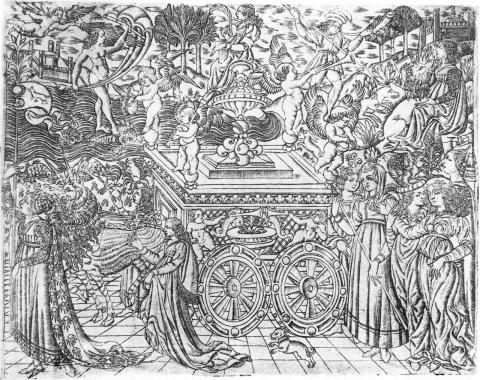
Italian sonnets, ballads, madrigals, Francesco has had an impact not only on poetry but also on music. Composers XIV (during the Renaissance) and then the nineteenth centuries put these verses as the basis of their musical works. For example, Franz Liszt wrote "Petrarch Sonnets" for piano under a deep impression of the poet's poems dedicated to Laura.
The autobiography of the "Epistola ad posteros" in a message to future generations. In this creation, Petrarch recounts the story of his life with external parties (talks about the key events in his life).
Autobiography "De contempu mundi", which translates as "On contempt for the world". This work was written in the format of a dialogue with the blessed Augustine. The second autobiography of the poet talks not so much about the external manifestations of the history of his life as of his inner development, the struggle between personal desires and an ascetic morality, and so on. Dialogue with Augustine becomes a kind of duel between humanist and religious-ascetic worldview in which the winner is still humanism.
Invective (angry diatribes) against the representatives of the cultural, political, and religious spheres. Petrarch was one of the first artists who can look at the statements, teachings, and beliefs of modernity from a critical point of view. So, widely known for his invective against a doctor who considered science more important than eloquence and poetry. Francesco also spoke out against the series of French prelates (representatives of the higher Catholic clergy), against (followers of the popular philosophies of the XIII century), Roman scholars of the past, and so on.
"Letters with no address" - works in which the author boldly criticizes the depraved morals of Rome in the XIV century. Petrarch lifetime was a deeply religious Catholic, but he had reverence for higher spiritual dignity, whose behavior is considered unacceptable, and did not hesitate to openly criticize them. "Letters without address" addressed to the invented characters, to real people. The idea of writing in this format Francesco borrowed from Cicero and Seneca.
"Africa" is an epic poem devoted to the exploits of Scipio. It also contains prayers and penitential Psalms.
The love of Petrarch was Laura, whose identity has still not been established for certain. After meeting with this girl poet for three years in Avignon, hoping to catch her casual look at the Church. In the year 1330, a poet moved to Lome, and seven years later bought an estate in Vaucluse, to live near Laura. Having taken Holy orders, Petrarch had no right to marry, however I do not shun carnal relations with other women. The story goes that Petrarch had two illegitimate child.
She Laura, apparently, was a married woman, a faithful wife and the mother of eleven children. The last time the poet saw his beloved September 27, 1347, and in 1348 the woman died.
The exact cause of death is unknown, but historians believe that it could be the plague, which in 1348 wiped out a significant portion of the population of Avignon. In addition, Laura could die from exhaustion due to frequent childbirth, and tuberculosis. Unknown, did Petrarch about feelings, and know whether Laura about its existence.
During the life of Petrarch, his literary works were appreciated by the public for dignity, and as a result he was invited to the coronation Laurel wreath from Naples, Paris and Rome (almost simultaneously). So I chose Rome, where he was crowned with a Laurel wreath at the Capitol on Easter 1341. Up to 1353 he lived in his estate in Vaucluse, sometimes leaving it for travelling or preaching missions.
- Log in to post comments
